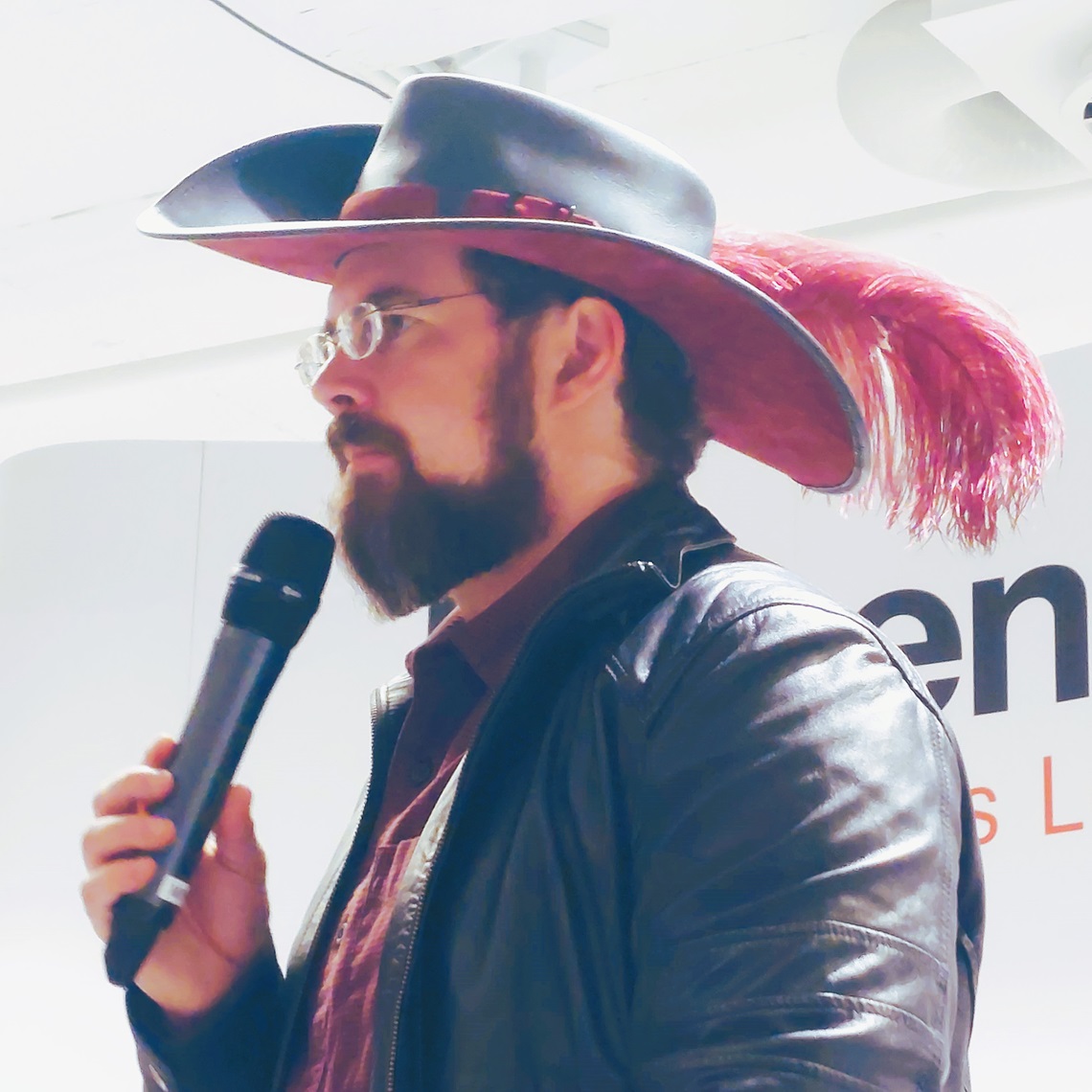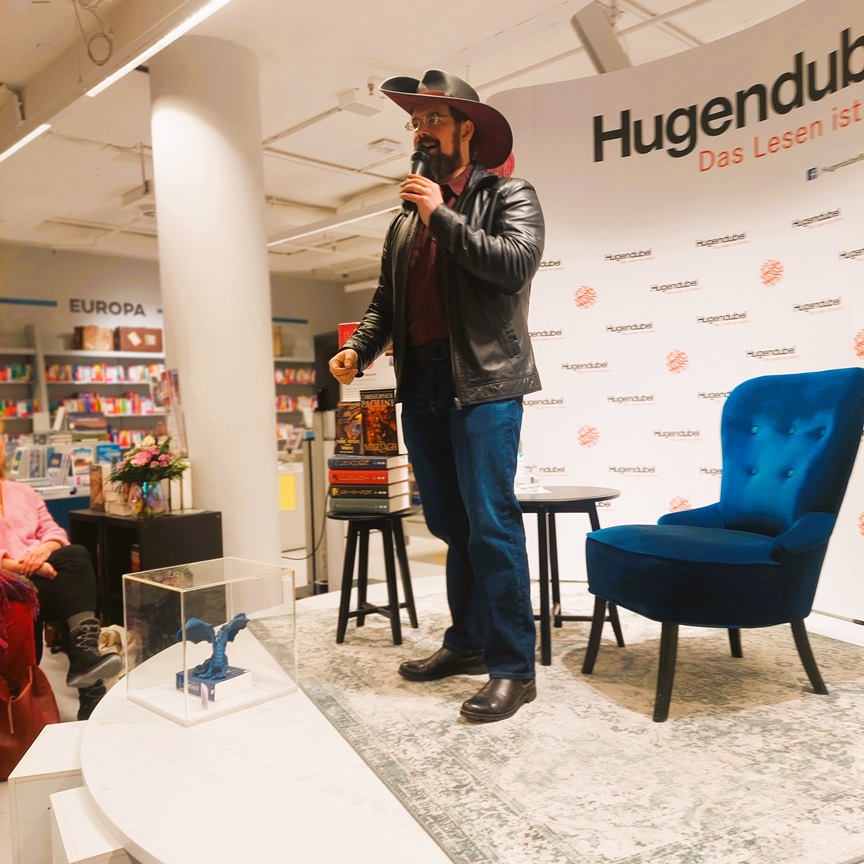1. Report on Paolini's reading event in Munich
 Christopher Paolini talking to his audience at the reading event in Munich (c) Michael Stierstorfer
Christopher Paolini talking to his audience at the reading event in Munich (c) Michael Stierstorfer
As a young boy, Paolini himself was not a fan of reading and initially did not enjoy it. He even hated reading. His mother, who was a Montessori teacher, taught him at home. When he went to a public school for his final exams, he wore a huge hat with a feather on the side - an heirloom - as he didn't know how to dress for school. He also wore this hat at his reading event in Munich, attracting everyone's attention. For a long time, Paolini appreciated reading and writing as true magic. It was only when he gained his first reading experiences, which were created out of boredom during the vacations, that he gradually understood that you can live other lives while reading and that as an author you can arouse real emotions in your readers. Paolini then enjoyed reading fantastic literature and science fiction endlessly.
Then he soon wrote the first version of Eragon, although Eragon was initially still called Kevin. It was only after several years of revision that the book gradually developed into a coherent story. When his freelancing parents thought about a project that could be used to support their son, he showed them the book. After further revisions, it was self-published. It was only when it accidentally fell into the hands of a major publisher who believed in Paolini’s idea that it became a huge global success. All in all, Paolini’s reading was a unique event. Paolini was very good at interacting and joking with his open-minded audience. The lively performance with private insights was totally funny, ironic and humorous, similar to a stand-up comedy show.
Even if Paolini only read one or two sentences from some of his books, he always conveyed a reliable impression of the whole through his intonation and explanations. The fantastic worlds he has created have become so second nature to him that he answered questions from his enthusiastic fan base spontaneously and with razor-sharp precision. There was a noticeable atmosphere of great mutual appreciation and sympathy between author and fans. Although Paolini's books have reached the top of the New York Times bestseller list, the author himself was anything but aloof. One of his most remarkable sentences was: „I prefer to produce media rather than consume it“.
In an interview with Michael Stierstorfer and Markus Janka before the event, he spoke about his literary sources of inspiration, the placement of his works on a streaming service and the relevance of his current work Murtagh in relation to the real world.
2. Interview with Christopher Paolini
 Christopher Paolini on stage in Munich (c) Michael Stierstorfer
Christopher Paolini on stage in Munich (c) Michael Stierstorfer
What are your literary sources of inspiration for creating your fabulous fantastic worlds?
All of the fantasy and mythology that I read, watched, and listened to growing up. Some of the usual suspects were The Hobbit and The Lord of the Rings by Tolkien, Beowulf, Le Morte d’Arthur by Mallory, The Wizard of Earthsea trilogy by Le Guin, and The Chronicles of Narnia by Lewis. But I was also influenced by somewhat lesser-known works such as The Worm Ouroboros by Eddison, The Gormenghast trilogy by Peake, and various novels by more modern authors like Raymond Feist, Tad Williams, Octavia Butler, and Andre Norton.
And of course, Star Trek, Star Wars, Babylon 5, and The Prisoner provided further inspiration.
How did you come up with the idea of writing about a symbiosis between humans and dragons in the Eragon series?
I loved reading about dragons as a child (still do, as a matter of fact). The Pit Dragon trilogy by Yolen, the Dragonriders of Pern series by McCaffery, and the Dealing with Dragons series by Patricia C. Wrede were some of my favorites growing up. However, I was specifically inspired by a book called Jeremy Thatcher, Dragon Hatcher by Coville, which is a charming young-adult book about a boy who goes into an antique store and ends up buying a stone that - of course - turns out to be a dragon egg. The idea of a young man finding a dragon egg appealed to me so much that I started to wonder what sort of a world a dragon would come from, how an egg might end up in the middle of a forest, who might find it, who else might be looking for it, and so forth and so on. By asking and answering those questions - and many more - I was able to build the story and world of the Inheritance Cycle.
What do you think of the film version of Eragon, which was not a success with audiences despite its high-quality cast, great digital effects and compelling story?
It’s not a horrible film . . . but it's not a particularly good adaptation, and ultimately, that's the problem. Few of the things that people enjoy in my books are in the film. (As one example: you wouldn't even know that the books contained elves and dwarves, if you just watched the movie.)
With your fantastic works about the land of Alagaësia, you have created a broad cosmos of magical stories. Are there any plans for a series to bring these popular narratives to a streaming service like Netflix or Disney Plus?
Yes, Disney Plus is currently developing Eragon as a television show for their channel. I'm attached as both an executive producer and co-writer. Similarly, To Sleep in a Sea of Stars (or Infinitum as it's known in German) is also being developed as a TV show, with me serving in a similar capacity for that as well.
Hopefully, Disney Plus’s television adaptation will do a better job of capturing the feel of the characters, world, and story than the just mentioned adaptation did.
After Eragon as a work of high fantasy, how did you come up with the idea of switching to the science fiction genre with Infinitum?
I grew up reading as much science fiction as fantasy, and I love to imagine the future that I firmly believe humans will have out among the stars. It was fun to play with those ideas for a time. Plus, switching allowed me to shake up my vocabulary, learn new things, and tell some stories that would have been impossible in the world of Eragon.
In the novel just mentioned, the biologist Kira enters into a symbiosis with a mysterious black space dust. Did the trilogy His dark materials by Pullman inspire you to this motif? What do you think of Pullman’s oeuvre?
Ha! No I wasn’t thinking of His Dark Materials when I described the dust, but I'm flattered that you would make the comparision. I'm a long-time fan of Pullman's work in that trilogy. It's one of the few books that really affected me emotionally. I haven’t read his sequel trilogy yet, but I’m looking forward to it.
In your latest novel Murtagh, you return to the fantastic realm of Alagaësia. How has your perspective on this fictional world changed?
Well, I have a much better understanding of the intricacies of this setting, which is something that only really comes with time (and thought). As a result, it feels more real to me. And I'm excited to continue to explore Alagaësia in future books. There’s magic in it for me, and for my readers as well, I believe.
In the novel just mentioned, you focus on the dragon rider Murtagh and his dragon Dorn, who were once, albeit reluctantly, on the evil side of the force. Are these two characters negative incarnations of Eragon and Saphira?
To a degree, but they're also very much their own people, given how different their life experiences have been compared to Eragon and Saphira. And they're aware of that difference. It's something Murtagh reflects on several times throughout the book. However, even if Murtagh and Thorn had been raised in the same circumstances as Eragon and Saphira, I think they would still be very different. Thorn has a much more trenchant sense of humor than Saphira, and even at the best of times, Murtagh would always have a greater tendancy toward brooding than Eragon.
The motif of the dragon plays a central role in most of your works. What fascinates you so much about this kind of creature? Does dragon symbolism also play a role in your private life?
Dragons and dragon-like creatures appear in myths and legends throughout the world, and they're invariably linked to the creation (and destruction!) of the world, as well as the health of the land itself, both in a positive and a negative fashion. Godzilla, for example, is a modern dragon. No other mythological creature carries as much symbolic weight, and from a storytelling standpoint, that’s irresistable.
Also, from a purely entertainment point-of-view: dragons are like the cooler version of dinosaurs. They can fly! They can breathe fire! And best of all, many of them can talk! What's not to like?
Your novel Murtagh is set in archaic, seemingly bygone times. What relevance does your work nevertheless have?
All of humanity's oldest stories are fantasy. The Epic of Gilgamesh, the Iliad and the Odyssey, Beowulf, and so forth and so on. Those stories have endured through the millenia, because they grapple with the deepest questions and urges of our species. Not only that, but fantasy allows us to externalize things that are otherwise internal, which gives the genre enormous dramatic potential. It doesn’t matter if you’re writing about magic or dragons or something else equally fantastic – not so long as your story remains grounded in the very real feelings and problems of the characters. Because that's what we care about and respond to. And as long as people remain people, fantasy will continue to resonate with readers throughout the world.
As for what specific relevance my work might have . . . I like to think that readers can recognize themselves in my characters, even if their circumstances might be radically different from those of a modern person. I often grapple with questions of the individual vs. society, the morality of violence, and the imporatance (and difficulty) of doing the right thing. All while trying to tell entertaining stories that leave readers feeling better than when they started.
You are currently touring Germany on your reading tour. How do you like it here? Are you perhaps even gathering ideas for new projects here?
I always enjoy visiting Germany during my book tours. My German readers are among the most passionate and interesting in the world, and they always impress me with their love for the series. (The number of tattoos I saw based upon the books was rather astounding.) And yes, I might have gotten a few new ideas for stories while visiting your country.
Thank you very much for your valuable time to answer our questions!
My pleasure! Thank you for the excellent questions. I hope my answers work for you.
In any case, we couldn't have imagined better answers.
If you are interested, click here for the German version of the interview.

